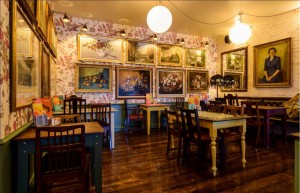Bristol-based neighbourhood café-bar operator Loungers has used the opening of its 100th outlet to unveil ambitious plans to invest £10m in further 16 Lounges this year 2018.
The firm, which also owns the Cosy Club bar-restaurant brand, promised no let-up in pursuing its expansion strategy across the UK. 
Its 100th venue, Sorrento Lounge in Moseley, Birmingham, pictured, maintains its approach to providing an all-day, value-for-money offer in an individually designed site.
It will be its eighth Lounge in Birmingham’s suburbs, a fact it said demonstrated the appeal and potential scale of the business. The group honed its approach in Bristol suburbs such as Fishponds, Westbury-on-Trym and on Gloucester Road, where it found a ready market for its ‘home-from-home’, laid-back venues.
So far this year it has opened five new neighbourhood café-bars – in Melton Mowbray, Stockport, Abingdon, Solihull and Ormskirk. Others are set to follow in Chorlton, Bicester, Grantham and Warrington and by the end of 2018 it expects to have added a total of 21 to its portfolio.
Loungers has outperformed much of the hospitality sector over recent years – with CEO Nick Collins putting this down mainly to its individualistic approach to each venue.
“Each Lounge is individually named, designed and managed by teams who feel a sense of ownership and responsibility towards their Lounge,” he said. “The business has evolved on the strength of the people who work with us and how we have been received in the communities in which we have opened.
“Our out-performance is testament to the great contribution from our teams, but we certainly don’t take it for granted. From a single site in the suburbs of Bristol to our 100th Lounge, the core principles of the business have never changed. We will continue to open new sites ensuring that the values that have driven our success to date are not compromised.”
The group also expects to open a further four or five Cosy Clubs a year. There are already 21 across the country. Cosy Clubs tend to operate in larger units and are more typically found in city centres and larger market towns.






























